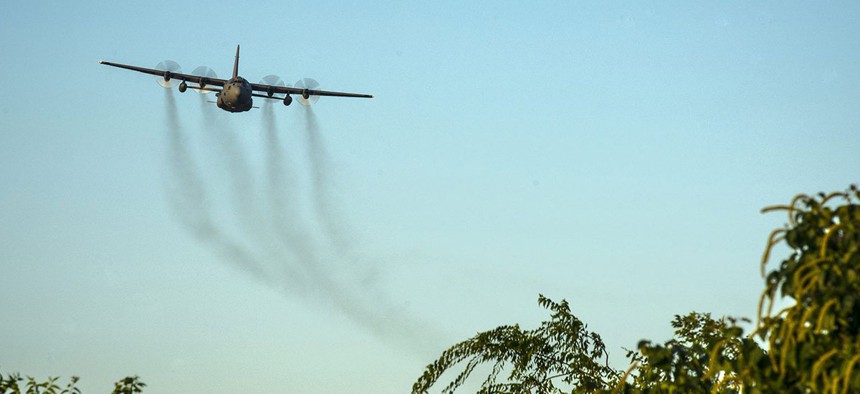
Air Force C-130s will be spraying 6 million acres in Texas for mosquitoes. Senior Airman Dennis Sloan/Air Force
Swarmed With Mosquitoes After Harvey, Texas Calls in the Air Force
The Air Force is spraying a controversial insecticide across 6 million acres to kill mosquitoes brought in by Hurricane Harvey.
In an effort to combat the swarms of mosquitoes apparently making mating grounds out of the standing water left behind from Hurricane Harvey, Texas has called in the big planes. The state asked the US Air Force to spray 6 million acres in the state with insecticide from in its low-flying C-130 cargo planes. The Air Force has long used its planes in mosquito-control missions.
The work began this weekend, with three counties sprayed so far, according to Reuters . The hope is that the spraying will prevent mosquito-borne disease (though most mosquitoes that arrive after flooding don’t carry disease, according to a Texas health official ), and prevent emergency response slowdowns by workers inundated by biting insects.
The Air Force is using naled, which is in the organophosphate category of insecticides, and though widely used in the US, is banned in the EU. The EU decided to ban naled in 2012 out of concern for human health. “The scenarios evaluated in the human health risk assessment as well as in the environmental risk assessment showed a potential and unacceptable risk,” the European Commission wrote in its decision .
American health officials disagree. Both the Centers for Disease Control and the US Environmental Protection Agency stand behind naled, saying the small amount of the insecticide sprayed from planes doesn’t expose people enough to pose a health concern.
An Air Force spokesperson reiterated that position in a news release , saying the insecticide will be used in volumes the EPA considers safe. “The system disperses droplets small enough to land on a mosquito’s wing, using less than one ounce of naled per acre. That’s less than one shot glass for an area the size of a football field,” the spokesperson said.
Naled is already everywhere in the US—health departments spray roughly 16 million acres in the country with the insecticide each year. It’s also often used after disasters like hurricanes and flooding to curb mosquitoes.
The chemical has caused controversy in recent years. In 2016, naled spraying inadvertently caused millions of honeybee deaths in South Carolina, and Florida health officials’ decision to spray naled in Miami Beach caused protest among residents. (Spraying there has continued .) When the CDC send a shipment of naled to Puerto Rico to combat Zika, Puerto Rican governor Alejandro García Padilla sent it back , according to the Guardian.
Naled works as a neurotoxin, killing mosquitoes by interfering with an enzyme essential to the nervous systems of both insects and humans. Research on whether it poses a threat to human nervous systems at the levels used to kill mosquitoes is limited. A 2016 study from the University of Michigan looked at babies living in China; they found that the babies most exposed to naled while in the womb scored 3% to 4% lower on fine motor skill tests than their less-exposed peers by the time they were nine months old.
Another study looked at Mexican-American children living in agricultural regions in California, where organophosphates like naled are used regularly—children there had higher rates of attention-deficit/hyperactivity disorder.
But when Mother Jones spoke to Dana Barr , one of the authors of the study on Mexican-American children, she mostly agreed that aerial spraying doesn’t pose as significant a threat. “Likely the small amount sprayed won’t pose significant risk,” she told the magazine , but said people who live in sprayed areas should “consider their exposures from other sources as well,” like from non-organic food and gardening insecticide. She also said women who are pregnant and infants should “take precautions to stay inside during spraying,” since they’d be most sensitive to any negative affects.






